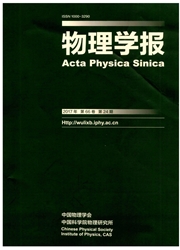

 中文摘要:
中文摘要:
采用基于密度泛函理论的第一性原理结合投影缀加平面波的方法,研究了GaN中Ga被稀土元素Gd替代以及与邻近N或Ga空位组成的缺陷复合体的晶格常数、磁矩、形成能以及电子结构等性质。结果发现, Gd掺杂GaN后禁带宽度变窄,由直接带隙半导体转为间接带隙半导体;单个Gd原子掺杂给体系引入大约7μB的磁矩;在Gd与Ga或N空位形成的缺陷复合体系中, N空位对引入磁矩贡献很小,大约0。1μB, Ga空位能引入约2μB的磁矩。随着Ga空位的增多,体系总磁矩增加,但增加量与Ga空位的位置分布密切相关。当Ga空位分布较为稀疏时, Gd单原子磁矩受影响较小,但当Ga空位距离较近且倾向于形成团簇时, Gd单原子磁矩明显增加,而且这种情况下空位形成能也最小。
 英文摘要:
英文摘要:
In recent years, GaN doped with Gd (GaN:Gd) has attracted much attention due to its potential applications in spintronic devices since the high temperature ferromagnetism and the colossal magnetic moment were observed in GaN:Gd. However, the microscopic nature of ferromagnetism in GaN:Gd still is controversial. We investigate the crystal parameters, magnetic moment, formation energies, and electronic structures of the defect complexes formed by Gd and native Ga (or N) vacancies in GaN by using the first-principles method based on the density functional theory. The calculated results show that the energy band gap of GaN:Gd becomes indirect and its width becomes small compared with that of GaN. The lattice constants of GaN:Gd expand due to the larger ionic radius of Gd than that of Ga atom, while they shrink when the Gd atom and Ga vacancies coexist. In the case of the isolated Gd dopant, the Gd-4f electrons lead to a magnetic moment of about 7 μB in GaN:Gd. For the defect complex, one Ga vacancy can introduce a magnetic moment of about 2 μB, while N vacancy has little effect on the total magnetic moment. In addition, when we focus on the defect complex composed of Gd and five neighboring Ga vacancies, we find that the magnetic moment of per Gd atom and the total magnetic moment depend strongly on the concentration and position of Ga vacancies. When the Ga vacancies are distributed loosely near the Gd atom, the magnetic moment of Gd atom increases slightly, while for the closely-distributed Ga vacancies the Gd magnetic moment can be increased by 2 μB. We infer that the interactions among Ga vacancies result in the large magnetic moment of Gd atom. It is also found that the formation energy is very small when the Ga vacancies are distributed thickly around the Gd atom in GaN:Gd. Our results are in qualitative agreement with the results from other studies (Thiess A, et al. 2012 Phys. Rev. B 86 180401;Thiess A et al. 2015 Phys. Rev. B 92 104418), where Ga vacancies were proposed to tend to
 同期刊论文项目
同期刊论文项目
 同项目期刊论文
同项目期刊论文
 期刊信息
期刊信息
